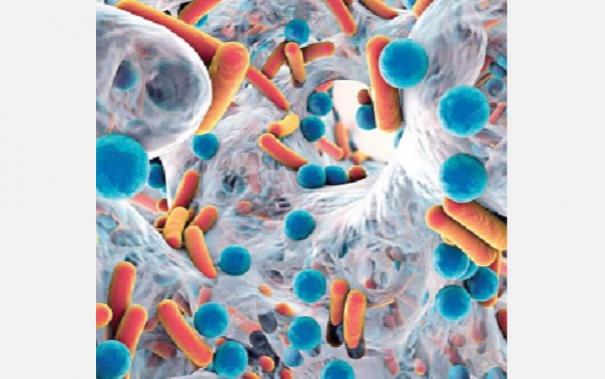Published : 24 Feb 2020 10:32 AM
Last Updated : 24 Feb 2020 10:32 AM
மனிதர்கள் உலகம் முழுக்க பரவ உதவிய பாக்டீரியா

Gut bacteria may have played bigger role in human evolution that previously thought: Study
Washington,
Bacteria living in the guts of our ancestors may have been more important for human evolution than previously thought, according to a study which suggests that the adaptive nature of the microbes may have helped the ancient people survive in new geographic areas.
The study assessed data from previously published studies to compare the community of different species of bacteria (microbiome) living in the guts of humans, apes, and other non-human primates. Based on the study, researchers suggested that the human gut microbiome adapted quickly to new environmental conditions. Dunn said.
When human ancestors walked into new geographic areas, they confronted new diet choices and diseases, and used a variety of different tools to obtain and process food, the scientists said.
The adaptive microbiome our ancestorshad, may have made it possible to digest or detoxify the foods they were eating in a local region, and increased their ability to endure new diseases, the study noted.
Microbial adaptation, the researchers believe, may have facilitated human success in a range of environments, allowing us to spread around the world.
The social sharing of microbes between the ancestral humans might have led to local microbial adaptations, they said. However, the scientists added that our ancestors did not just share their microbiome amongst each other but may have also outsourced them into their food.
Citing an example, they said, with the invention of artificial fermentation methods, similar to those used to make cheese, the early humans may have "extended" their guts outside of their bodies by co-opting body microbes to allow digestion to begin externally.
This may have allowed humans to store food and stay in one place for a longer time, facilitating the persistence of larger groups living together, the study said.-PTI
மனிதர்கள் உலகம் முழுக்க பரவ உதவிய பாக்டீரியா
வாஷிங்டன்:
மனித இனத்தின் மூதாதையரின் குடல் பகுதியில் குடியிருந்த பாக்டீரியாக்கள் மனித பரிணாம வளர்ச்சியில் முதன்மை
பங்காற்றியதாக புதிய ஆய்வில் தெரியவந்துள்ளது. புதிய நிலப்பரப்புகளுக்கு மனித இனம் குடிபெயர்ந்த போது அங்கு
தாக்குப்பிடித்து உயிர் வாழ இந்த நுண்ணுயிர்கள் உதவி இருக்கக்கூடும் என்று கண்டுபிடிக்கப்பட்டுள்ளது.
மனிதர்கள், மனிதக்குரங்குகள், இதர பாலூட்டிகளின் குடலில் வெவ்வேறு வகைப்பட்ட பாக்டீரியாக்கள் உள்ளன. இவற்றை ஒன்றுடன் ஒன்று ஒப்பிட்டுக்கிடைத்த தகவலின் அடிப்படையில் மேற்கொள்ளப்பட்ட ஆய்வு இது. அப்படி ஆராய்ந்ததில் மனிதக்குடிலில் காணப் படும் பாக்டீரியாக்கள் புதிய சூழலுக்குத் துரிதமாக தங்களைத் தகவமைத்துக் கொள்வது தெரிய வந்துள்ளது.
மனித இனத்தின் மூதாதையர் புதிய நிலப்பரப்புக்குள் நுழைந்த போது புதிய உணவு முறை மட்டுமின்றி புதிய நோய்களையும் எதிர்கொள்ள வேண்டி இருந்தது. இதனால் உணவை பதப்படுத்த அவர்கள் வித்தியாசமான கருவிகளை பயன்படுத்தினார்கள். அப்போது அவர்கள் குடலில் இருந்த பாக்டீரியாக்கள் புதியவகை உணவு பண்டங்களை ஜீரணிக்கவும் ஒவ்வாமையைச் சரி
செய்யவும் கற்றுக்கொண்டன. இதன் மூலம் நோய் எதிர்ப்புச் சக்தியானது மனிதர்களுக்கு வளர்ந்தது.
மனித குடலில் குடிகொண்டிருந்த பாக்டீரியாவின் உதவியால்தான் மனிதர்கள் வெற்றிகரமாக வெவ்வேறு பிரதேசங்களுக்கு குடிபெயர்ந்தார்கள். சொல்லப்போனால் மனிதக் குலம் உலகம் முழுவதும் பரவித் தழைத்தோங்கியது இந்த பாக்டீரியாவினால் தான் என்பதுஇந்த ஆராய்ச்சியில் தெரியவந்துள்ளது.
உடலுக்குள் இருந்தபடி மனிதர்கள் உதவியது மட்டுமல்லாமல் உணவு பண்டங்களை பதப்படுத்தவும் இந்த பாக்டீரியாக்கள் உதவுகின்றன. உதாரணத்துக்கு, மனித உடலுக்குள் குடியிருந்த பாக்டீரியாக்களை கை வழியாகப் பரிமாறமுடியும் என்பதை கண்டுபிடித்ததன் மூலம்தான் உரைமோர் கொண்டு பாலை தயிராக்கும் வித்தையை மனிதர்கள் கண்டுபிடித்தார்கள். மொத்தத்தில் மனிதர்கள் உணவைச் சேமிக்கவும் ஒரே இடத்தில் நெடுங்காலம் தங்கி வாழ்க்கையை நடத்தவும், குழுக்களாக இணைந்து கூடி வாழவும் வழி வகைசெய்தது இந்த பாக்டீரியாக்கள் என்றால் மிகையாகாது என்கிறது இந்த ஆய்வு.-பிடிஐ
FOLLOW US
Sign up to receive our newsletter in your inbox every day!


WRITE A COMMENT